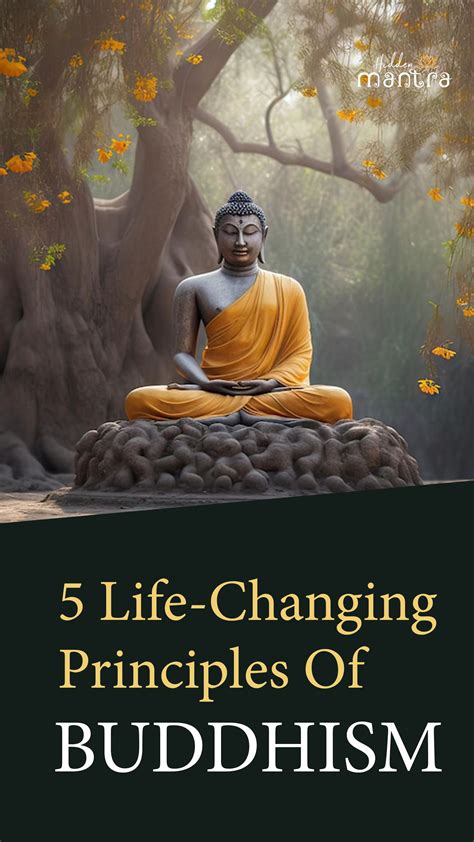In the pursuit of inner peace, many individuals turn to the ancient wisdom of Buddhism. This profound philosophy, which originated over 2,500 years ago, offers a comprehensive guide to understanding the nature of suffering and the path to liberation. At its core, Buddhism is not just a religion, but a way of life that fosters mindfulness, compassion, and wisdom. The 12 Buddhism principles outlined below provide a foundational framework for cultivating inner peace, clarity, and a deeper connection to oneself and the world.
1. The Impermanence of All Things
Buddhism teaches that everything in life is transient, including thoughts, feelings, and physical phenomena. Understanding and accepting this impermanence helps in letting go of attachments, which are often the root of suffering. By embracing change as an inevitable part of life, individuals can cultivate a sense of detachment and acceptance, leading to greater inner peace.
2. Non-Violence and Compassion
The principle of non-violence (ahimsa) and compassion towards all living beings is central to Buddhist teachings. Practicing kindness, empathy, and understanding towards oneself and others fosters a sense of interconnectedness and reduces conflict, both internally and externally. This compassionate approach to life helps in creating a peaceful and harmonious environment.
3. The Middle Way
Buddha’s teachings emphasize the importance of finding a balance between extremes. The Middle Way refers to a path of moderation, avoiding both excessive indulgence and stringent asceticism. By embracing this principle, individuals can navigate life’s challenges with greater ease, equilibrium, and peace, as they are neither overly attached to worldly pleasures nor overly deprived.
4. Mindfulness and Being Present
Mindfulness, or the practice of being fully present in the current moment, is a cornerstone of Buddhist meditation. It involves observing thoughts, emotions, and sensations without judgment, allowing for a deeper understanding of oneself and the world. This mindful approach to life reduces worry about the past or future, cultivating peace in the present moment.
5. The Four Noble Truths
The Four Noble Truths are fundamental to Buddhist philosophy, outlining the truth of suffering, the truth of the origin of suffering, the truth of the cessation of suffering, and the truth of the path to the cessation of suffering. Understanding these truths provides a framework for recognizing the causes of distress and the path to overcoming them, leading to inner peace and enlightenment.
6. Interdependence
The concept of interdependence, or dependent origination, highlights how all phenomena arise dependent on other factors and conditions. Recognizing this interdependence fosters a sense of unity and responsibility, encouraging actions that contribute to the well-being of all, and thereby promoting peace and harmony in the world.
7. Karma and Ethical Living
Buddhism teaches the principle of karma, where every action has consequences. Ethical living, guided by principles such as not harming others, being truthful, and cultivating generosity, is essential for creating positive karma. By living ethically, individuals contribute to their own peace of mind and to the peace and harmony of the world.
8. Meditation and Mental Discipline
Meditation is a powerful tool in Buddhist practice for cultivating mental clarity, concentration, and wisdom. Regular meditation helps in disciplining the mind, reducing distractions, and increasing awareness. This mental discipline is key to achieving inner peace, as it enables individuals to navigate life’s challenges with greater equanimity and insight.
9. Letting Go of Attachments
Attachments to things, ideas, and outcomes are seen as significant sources of suffering in Buddhist teachings. Learning to let go of these attachments frees the individual from the cycle of craving and aversion, leading to a sense of liberation and peace. This principle encourages a simpler, more contented way of living.
10. Cultivating Wisdom
Wisdom, or the deep understanding of the nature of reality, is the ultimate goal of the Buddhist path. It involves seeing things as they truly are, without delusion or ignorance. Cultivating wisdom through study, reflection, and meditation is essential for making wise decisions, living a virtuous life, and achieving lasting inner peace.
11. Community and Spiritual Friendship
The importance of community (sangha) in Buddhist practice cannot be overstated. Spiritual friendships and community support provide encouragement, guidance, and a sense of belonging on the path to inner peace. Engaging with like-minded individuals reinforces positive behaviors and inspires personal growth.
12. Self-Reflection and Personal Growth
Finally, Buddhism encourages a commitment to self-reflection and continuous personal growth. Recognizing one’s faults and limitations, and being open to change and improvement, are crucial for spiritual development. This ongoing process of self-reflection and growth fosters humility, wisdom, and peace, as individuals strive to become the best version of themselves.
Implementing These Principles
Implementing these 12 principles into daily life can seem like a daunting task, but it begins with small, consistent steps. Starting a meditation practice, even just a few minutes a day, can cultivate mindfulness and reduce stress. Engaging in acts of kindness towards others can foster a sense of compassion and community. Reflecting on one’s actions and their consequences can encourage ethical living and personal growth.
Conclusion
The path to inner peace, as outlined by these 12 Buddhism principles, is a journey of self-discovery, growth, and understanding. It requires patience, dedication, and a genuine desire to cultivate peace and wisdom. By embracing these principles, individuals can navigate life’s complexities with greater ease, find peace in the midst of chaos, and contribute to creating a more harmonious world.
How can I start practicing Buddhism for inner peace?
+Starting to practice Buddhism for inner peace can begin with simple steps such as initiating a daily meditation practice, reading Buddhist teachings, and incorporating principles like mindfulness and compassion into your daily life. It's also beneficial to find a local Buddhist community or sangha for support and guidance.
What role does meditation play in achieving inner peace through Buddhism?
+Meditation is a foundational practice in Buddhism for achieving inner peace. It helps in cultivating a clear and focused mind, reducing stress and anxiety, and increasing self-awareness. Regular meditation practice can lead to a deeper understanding of oneself and the world, fostering wisdom, compassion, and peace.
How can I balance Buddhist principles with my daily life and responsibilities?
+Balancing Buddhist principles with daily life involves integrating mindfulness, compassion, and wisdom into your actions and decisions. This can be achieved by setting aside time for meditation and reflection, applying ethical principles in your interactions, and cultivating a mindful approach to work and relationships. The key is to find harmony and apply these principles in a way that feels authentic and manageable within your lifestyle.
Embarking on the Buddhist path to inner peace is a personal and profound journey. It is a commitment to growth, learning, and self-improvement, with the ultimate goal of achieving a state of profound peace, wisdom, and liberation. By embracing these principles and integrating them into daily life, individuals can experience a transformative journey that benefits not only themselves but also those around them.



